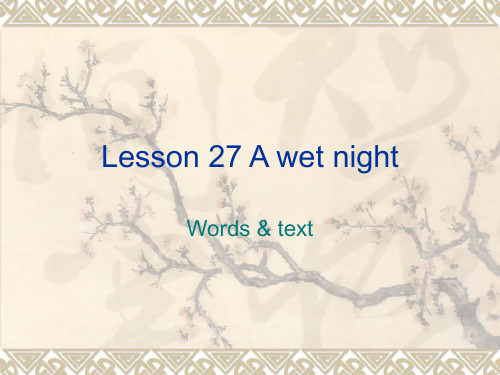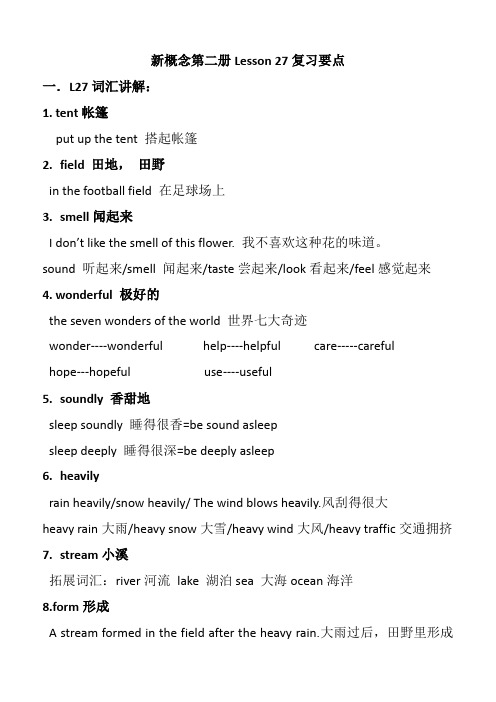裕兴新概念英语第二册笔记 第27课
- 格式:doc
- 大小:2.12 MB
- 文档页数:14


新概念第二册Lesson 27复习要点一.L27词汇讲解:1.tent帐篷put up the tent 搭起帐篷2.field 田地,田野in the football field 在足球场上3.smell闻起来I don’t like the smell of this flower. 我不喜欢这种花的味道。
sound 听起来/smell 闻起来/taste尝起来/look看起来/feel感觉起来4.wonderful 极好的the seven wonders of the world 世界七大奇迹wonder----wonderful help----helpful care-----carefulhope---hopeful use----useful5.soundly 香甜地sleep soundly 睡得很香=be sound asleepsleep deeply 睡得很深=be deeply asleep6.heavilyrain heavily/snow heavily/ The wind blows heavily.风刮得很大heavy rain大雨/heavy snow大雪/heavy wind大风/heavy traffic交通拥挤7.stream小溪拓展词汇:river河流lake 湖泊sea 大海ocean海洋8.form形成A stream formed in the field after the heavy rain.大雨过后,田野里形成了一条小溪。
主意区分:form和from9.wind 蜿蜒The snake wound itself around the wire.蛇把自己缠绕在电线上。
10.right 正好I was right there.我正好在那儿。
11.creep---climb/leap---jump词语辨析:creep 爬行,水平方向有位移climb 垂直方向有位移leap 水平方向有位移的跳跃jump 垂直方向的跳二.系动词:系动词后可以加形容词作表语系动词的分类:a.be 动词b.感官动词:feel/look/sound/taste/smellc.表示变化的动词:get/go/come/become/turn/falld.保持,保存:stay/remain/keepThis sandwich has gone bad.这个三明治已经坏了。




Lesson 27 Mrs. Smith's living room语音 --- 句子重音:1.一般来说,在句子中实义词重读,虚词不重读。
名词、形容词、数词、动词、副词、感叹词属实义词,在句子中一般需要重读;而冠词、助动词、前置词、连接词是虚词,通常在句子中不重读。
代词在句子中有时需要重读,有时则不用重读。
--- How can I help you?--- I've hurt my hand.--- How did it happen?--- I was opening a tin. It was hard to open and I was in a hurry. When it was half open, the tin-opener slipped. I cut my hand. It was terrible. 2.助动词、系动词与情态动词在句子结尾有句子重音,在句首可有可无。
--- Can you drive a car?--- Yes, I can.--- Excuse me. Is this a bank?--- Yes, it is.New words and expressions:living room 客厅near prep.靠近window n.窗户armchair n.扶手椅door n.门picture n. 图画wall n.墙living room客厅sitting roombedroom n.卧室kitchen n.厨房dining room n.餐厅toilet n.厕所bathroom n. 洗澡间,卫生间study n. 书房balcony n. 阳台basement n.地下室near prep. 靠近near the school 靠近学校eg. There are some trees near the school.靠近学校的地方有一些树。
A wet night雨夜-新概念英语第二册自学导读笔记第27课新概念英语第二册第27课课文重难点 further notes on the text1.…the boys put up their tent in the middle of a field.……孩子们在田野中央搭起了帐篷。
in the middle of表示"在……当中"、"在……中间",既能够用于表示地理位置,又能够用于表示时间或在某个过程当中:he heard someone shouting in the middle of the night.午夜前后,他听到有人大声叫喊。
mary was in the middle of reading when her aunt arrived.玛丽的姑妈到达时,玛丽正在读书。
in the centre of(在……中部/中央)则一般用于表示地理位置:alice spring is a small town in the centre of australia.艾利斯斯普林斯是澳大利亚中部的一个小镇。
2.…they cooked a meal over an open fire.……他们就在篝火上烧起了饭。
open fire指无遮盖的、没有围起来的火,如篝火、盆火等。
3.…they told stories and sang songs by the campfire.……(他们)就围在营火旁讲起了故事,唱起了歌。
介词by 表示"在……旁边"、"靠近",通常指距离非常近:come and sit by me.过来靠我坐。
there are many trees by the river.河边有很多树。
4.but some time later it began to rain.但过了一阵子,天下起雨来。
逐句精讲新概念英语第二册:第27课雨夜Lesson27 A wet night 课文内容:Late in the afternoon, the boys put up their tent in the middle of a field. As soon as thiswas done, they cooked a meal over an open fire. They were all hungry and the food smelt good. After a wonderful meal, they told stories and sang songs by the camp fire. But some time later it began to rain. The boys felt tired so they pet out the fire and crept into their tent. Their sleeping-bags were warm and comfortable, so they allslept soundly. In the middle of the night, two boys woke upand began shouting. The tent was full of water! They all leapt out of their sleeping-bags and hurried outside. It was raining heavily and they found that a stream had formed in the field. The stream woundits way across the field and then flowed right under their tent! 语法归纳:复习一般过去时一句话总结:一般过去时的句子中经常会出现表示过去的时间状语,这些时间状语主要有:yesterday 昨天;last spring 上个春天;a few days ago 几天前;many years ago 数年前; in 1990 在1990年;last night 昨晚;this morning 今天早上;等等。
Lesson 27 A wet night雨夜What happened to the boys in the night?Late in the afternoon, the boys put up their tent in the middle of a field. As soon as this was done, they cooked a meal over an open fire. They were all hungry and the food smelled good. After a wonderful meal, they told stories and sang songs by the campfire. But some time later it began to rain. The boys felt tired so they put out the fire and crept into their tent. Their sleeping bags were warm and comfortable, so they all slept soundly. In the middle of the night, two boys woke up and began shouting. The tent was full of water! They all leapt out of their sleeping bags and hurried outside. It was raining heavily and they found that a stream had formed in the field. The stream wound its way across the field and then flowed right under their tent!参考译文傍晚时分,孩子们在田野中央搭起了帐篷。
这件事刚刚做完,他们就在篝火上烧起了饭。
他们全都饿了,饭菜散发出阵阵香味。
他们美美地吃了一顿饭后,就围在营火旁讲起了故事,唱起了歌。
但过了一阵子。
天下起雨来,于是他们扑灭了篝火,钻进了帐篷。
睡袋既暖和又舒服,所以,他们都睡得很香。
午夜前后,有两个孩子醒了,大声叫了起来。
原来帐篷里到处都是水!他们全都跳出睡袋,跑到外面。
雨下得很大,他们发现地上已经形成了一条小溪。
那小溪弯弯曲曲穿过田野,然后正好从他们的帐篷底下流过去。
【New words and expressions】(15)tent n. 帐篷put up a tent 搭帐篷/pitch [pitʃ] a tentpeg down a tent 用木桩固定帐篷pull down a tent 拆帐篷/strike a tenteg. We always sleep in a tent when we go camping. 我们宿营时,总是睡在帐篷里。
field n. 天地,田野,领域,专业,视野in the field 在田地里develop unexplored fields of industries 开发未曾探索的工业领域one’s special field 某人的专业a wide field of vision 广阔的视野smell v. 闻起来smelled/smelt1) (感官动词) + adj.2) 不用于被动语态,不用于进行时态eg. The fish smells good. 这鱼闻起来不错。
eg. The fish smells delicious. 这鱼闻起来就好吃。
这类动词很常见:eg. The story sounds interesting. 这故事听起来很有趣。
(sound 听起来)eg. The girl looks charming. 那女孩看上去很有魅力。
(look 看起来)eg. The material feels soft. 这布料摸上去很柔软。
(feel 摸起来)smell v. 嗅到(实意动词)eg. I can smell trouble coming. 我凭直觉感到要有麻烦了。
eg. I smelled something burnt. 我闻到有什么东西烧糊了。
smell round/smell about 东嗅西嗅,到处打听/nose aroundeg. The dogs were smelling round, perhaps they smelt the thief.这些狗到处闻,也许它们闻到贼的气味了。
smell of 带有…气味(通常指令人不快的气味)eg. Your breath smells of brandy. 你的呼吸带有白兰地的气味。
eg. The house smells of paint. 这座房子有油漆的气味。
wonderful adj. 极好的campfire n. 营火,篝火campn. 营地a holiday camp 度假营地crawl 使用于如蛇类,无足,以腹部着地而行或者动作迟缓之虫类,而creep则表示四足动物缓慢而行,然而,快速前进之虫类,仍多以creep 表示。
sleeping bag睡袋sleeging car 卧铺车厢/sleepersleeping pill 安眠药eg. Let sleeping dogs lie. (谚)不捅马蜂窝,蜂也不来蛰。
comfortable adj. 舒适的comfort n.[U]1) 舒适,身心健康,安慰live in comfort 过得舒适a few words of comfort 几句安慰的话2) 令人安慰的人或事 (single)eg. Her children are a great comfort to her. 对她来说,孩子们是很大的安慰。
3) (生活方面)使人舒适的设备(pl.)comfort station 公共厕所 (Am.)public convenience 公共厕所 (Br.)comfort sb 安慰某人eg. The mother comforted the disappointed boy. 妈妈安慰那个失望的孩子。
comfortable adj. 舒适的←→ uncomfortable 不舒适的a comfortable chair 一把舒适的椅子a comfortable car 一辆舒适的车子eg. Make yourself comfortable! 请别客气!comfortably adv. 舒适地相当于 in comforteg. She sat in the sofa comfortably. 她舒适地坐在沙发上。
/She sat in the sofa in comfort.soundly adv. 酣睡地,充分地sleep soundly 睡得香甜sleep deeply 睡得很沉sleep well 睡眠很好be fast asleep 睡得香甜sound adj. (睡眠)酣的,香甜的,不中断的;(睡眠的人)酣睡的1) be a sound sleeper 一个睡得很香的人/be a deep sleeper2) a sound heart (身心)健康的,健全的eg. A sound mind in a sound body. 健康的心理寓于健康的身体。
3) 合理的,正确的,坚定的a sound judgement 合理的判决eg. She is sound on her future. 她对未来有信心。
leap [li:p] vi. 跳,跳跃(jump as fast as one can; jump over)(leapt, leapt) [lept, li:pt]eg. We leapt out of the tent. 我们蹦出帐篷。
eg. My heart leapt for joy at the news. 听到这个消息后,我的心情万分激动。
leap 大多用于“前方”的跳跃jump 向“前方”,“上方”,任一方的跳跃皆可。
leap n. 跳跃eg. She made beautiful leaps. 她优美地跳跃了几下。
Great Leap Forward 大跃进(1958)by leaps and bounds 突飞猛进,迅速地leap year 闰年a leap in the dark 有勇无谋的行为,瞎闹heavily adv. 大量地heavy1) adj. 沉的;超出一般规模、数量、力量的;重大的a heavy rain 大雨eg. It rains cats and dogs. 倾盆大雨/It rais whales and elephants.a heavy snow 大雪a heavy crop 丰收a heavy cold 重感冒a heavy smoker 大烟鬼a heavy drinker 酒鬼heavy traffic 交通拥挤heavy loss 巨大损失a heavy sleeper 睡得很死的人2) (食物)腻人的,难消化的heavy food 油腻的食物/rich food ←→light food 清淡的食物form n. 表格,形式fill in the forms 填表格fill in the blanks with the right forms of verbs 用动词的正确形式填空v.1) 形成,构成a stream had formed in the field. 一条小溪在地里形成了form sentences 造句/ make sentences2) 形成(想法,计划,意见等)eg. I cannot form an opinion about it. 对这件事我没有意见,formal adj. 正式的←→ informal 不正式的formal clothes 礼服formal adj. 表面上的formal politeness [pə’laɪtnɪs] 表面上殷情stream n. 小溪in a stream 川流不息/ in streamsa stream of water 一股溪流river 江河brook [bruk] 小河,小溪lake 湖a stream of people 人潮川流不息(喻)wind1) n. [wind] 风a strong wind 强风,大风/a heavy windnorth wind 北风2) v. [waınd] 蜿蜒(wound, wound) [waund]a winding road 一条蜿蜒的小路eg. The river winds down to the sea. 小河蜿蜒流向大海。